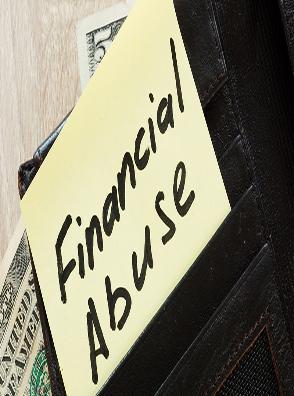What is Financial Abuse?
Home / Married / Domestic Violence and Abuse
IMPORTANT SAFETY NOTE
Computer use can be monitored by an abuser, even when you attempt to conceal or clear it. If you need assistance but are worried that your Internet use is being monitored, call the National Domestic Violence Hotline at 1−800−799−7233 or TTY 1−800−787−3224. For more about Internet and social media safety in abuse situations, visit Tech and Social Media Safety.

It isn’t normal for someone to have control over your financial life, even if you are married or live together.
Financial abuse happens when an abuser uses control of finances to maintain power in a relationship. According to researchers, this form of abuse occurs in 99% of physically abusive relationships.
Victims of domestic violence often say that financial abuse is the main reason they stayed with an abusive partner. This is because the financial burden placed on them made survival on their own seem impossible.
Financial abuse also makes staying safe after leaving an abusive partner even more difficult.
What are the Signs that You or Someone You Know is a Victim of Financial Abuse?
In some cases of financial abuse, abusers may steal a victim’s money, prevent them from working, or sabotage their employment.
However, many forms of financial abuse are more subtle, like when an abuser hides financial information or withholds money for items you or your children need.
Unlike other forms of abuse, financial abuse can be difficult to recognize and may happen slowly over time. In the beginning, your partner may appear to be doing you a favor. They may say something like: “Let me take care of the finances so you don’t have to deal with the added stress.” Following this deception, your partner may offer you a weekly allowance that, over time, grows smaller and smaller.
Eventually, you may try to take back control of your money, but find the accounts have all been moved or that you no longer have access to these funds. Abusers may also use intimidation-violence or threats of violence to keep you from working or to account for every penny you spend. Financial abuse can be isolating because you, as the victim, become financially dependent on your abuser. So, it’s important to recognize the signs of financial abuse as quickly as possible.
Below are some examples of the methods abusers use to control their partner’s financial lives.
You or Someone You Know May be a Victim If:
Your partner . . .
- Prevents you from working.
- Stalks or harasses you at work.
- Prevents you from attending job training or won’t allow you to pursue advancement opportunities.
- Refuses to give you access to bank accounts.
- Constantly questions purchases you make and makes you show receipts.
- Makes financial decisions without consulting you.
- Gives you “an allowance” or withholds money.
If you feel like you or someone you know are being abused, learn how to get help.
Written by Dylan Klempner, lead writer, SMART Couples, Department of Family, Youth and Community Sciences, University of Florida
Edited by Kristina Forman, lead editor, SMART Couples, Department of Family, Youth and Community Sciences, University of Florida
References
U.S Department of Health & Human Services Office on Women’s Health. Financial abuse. Retrieved from https://www.womenshealth.gov/relationships-and-safety/other-types/financial-abuse.
National Network to End Domestic Violence. About Financial Abuse. Retrieved from https://nnedv.org/content/about-financial-abuse/.
Postmus, J., Hoge, G., Breckenridge, J. (2018) Economic Abuse as an Invisible Form of Domestic Violence: A Multicountry Review. Retrieved from https://journals.sagepub.com/doi/10.1177/1524838018764160.
Adams, A. Measuring the Effects of Domestic Violence on Women’s Financial Well-Being. Retrieved from https://centerforfinancialsecurity.files.wordpress.com/2015/04/adams2011.pdf.
Return to Topic: Domestic Violence and Abuse


